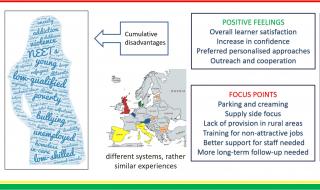The Horizon 2020 project ENLIVEN – Encouraging Lifelong Learning for an Inclusive and Vibrant Europe – has come to an end. The project – worth EUR 2.5 million – brought together partners from nine European countries and included a self-funded partner from Australia.
Professor Ellen Boeren (University of Glasgow) led the Scottish team and was responsible for Deliverables in relation to the participation of vulnerable young adults across Europe. The participating countries in ENLIVEN were characterised by different system characteristics. England and Scotland represented the liberal Anglo-Saxon welfare states, Flanders and Austria the conservative countries characterised by extensive vocational education and training. Italy and Spain represented the Southern Mediterranean region, characterised by above-average incidences of youth unemployment and weaker participation rates in lifelong learning. Three post-socialist countries participated in the project: Estonia, Slovakia and Bulgaria. Of these three, Estonia is most advanced in catching up with the Western countries in the European region.
Part of the project explored the participation of young adults in standardised training schemes across Europe: the Youth Guarantee and Upskilling Pathways. The first scheme helps young adults to make a transition into the labour market or further education and training, the second one helps them to increase their basic skills and levels of empowerment. In each country, local policy makers, managers of education and training initiatives, practitioners working with adult learners and young adult learners themselves were interviewed about their participation in one of these schemes. In total, twenty programmes were being analyses: a Youth Guarantee and Upskilling Pathways programme in each of the ten countries – including Australia.
The results of this qualitative piece of research can be found in the infographic in the inset [above right; click to enlarge].
Despite the different types of countries and the welfare states they represent, the experiences of adult learners and practitioners were strikingly similar across countries. From Scotland to Bulgaria, young adults were happy they had decided to participate and reported an increase in their self-confidence. In all countries, education and training intervention were a combination of group activities and individualised support. The young adult learners, whose lives were characterised by strong levels of cumulative disadvantages, mostly preferred one-to-one support. Across all countries, practitioners reported the use of outreach and cooperation with a large range of social services in order to attract these adult learners. Given their disadvantages, they are unlikely to enrol for a course independently.
However, a range of focus points was also highlighted during our work. Too often, education and training institutions experienced too much pressure to select young adults with the highest predicted success rates, as these would bump up their statistics to secure follow-up funds. A mechanism of parking and creaming was discovered across Europe. It was also highlighted that European-wide schemes like the Youth Guarantee and Upskilling Pathways are in fact very ‘supply-driven’. Increasing young adults’ skills is important, but will only work if high-quality employment is available to them. Countries reported that these schemes often prepare young adults for jobs that are not attractive and that the unwillingness of people to move away from rural areas makes it difficult for them to find employment. While young adults across Europe seemed generally satisfied with their participation, staff members were more hesitant and tended to find work with disadvantaged groups quite challenging. Last but not least, the team looked into the tracking of participants who went through these types of training interventions but had difficulties in identifying strong indications on the long-term pathways of these young adults. As such, it was difficult to make claims on the effectiveness of these schemes.
ENLIVEN contained a number of other strands of work, including the development of an Intelligent Decision Support System underpinned by Artificial Intelligence to help policymakers design education and training interventions for disadvantages groups. The website will remain open and updates on output will be posted on a regular basis.
More information: https://h2020enliven.org/
Professor Ellen Boeren
Best Authentic Sneakers | Nike News
Discussion topics:
- Log in to post comments














Latest Comments